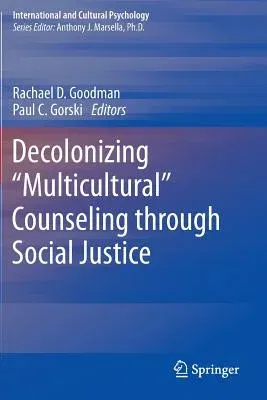Multicultural counseling and psychology evolved as a response to the
Eurocentrism prevalent in the Western healing professions and has been
used to challenge the Eurocentric, patriarchal, and heteronormative
constructs commonly embedded in counseling and psychology. Ironically,
some of the practices and paradigms commonly associated with
"multiculturalism" reinforce the very hegemonic practices and paradigms
that multicultural counseling and psychology approaches were created to
correct.
In Decolonizing "Multicultural" Counseling through Social Justice,
counseling and psychology scholars and practitioners examine this
paradox through a social justice lens by questioning and challenging the
infrastructure of dominance in society, as well as by challenging
ourselves as practitioners, scholars, and activists to rethink our
commitments. The authors analyze the ways well-meaning clinicians might
marginalize clients and contribute to structural inequities despite
multicultural or cross-cultural training, and offer new frameworks and
skills to replace the essentializing and stereotyping practices that are
widespread in the field. By addressing the power imbalances embedded in
key areas of multicultural theory and practice, contributors present
innovative methods for revising research paradigms, professional
education, and hands-on practice to reflect a commitment to equity and
social justice. Together, the chapters in this book model transformative
practice in the clinic, the schools, the community, and the discipline.
Among the topics covered:
- Queering multicultural competence in counseling.
- Developing a liberatory approach to trauma counseling.
- Decolonizing psychological practice in the context of poverty.
- Utilizing indigenous paradigms in counseling research.
- Addressing racism through intersectionality.
A mind-opening text for multicultural counseling and psychology courses
as well as other foundational courses in counseling and psychology
education, Decolonizing "Multicultural" Counseling through Social
Justice challenges us to let go of simplistic approaches, however
well-intended, and to embrace a more transformative approach to
counseling and psychology practice and scholarship.


